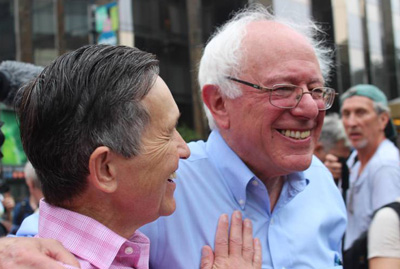The first question that Anderson Cooper asked Bernie Sanders was, “A Gallup poll says half the country would not put a socialist in the White House. You call yourself a democratic socialist. How can any kind of socialist win a general election in the United States?” Sanders responded in part by saying, “Democrats at the White House on down will win, when there is excitement and a large voter turnout, and that is what this campaign is doing.”
The point was that in prime time (the beginning of the debate), Cooper gave Sanders an opportunity to explain what it is to be a democratic socialist and why he thinks that he can win. The fact that Cooper questioned Sanders about his progressive ideas, not just once, but throughout the debate, shows how far we have come in eight years.
In 2008, there was one true progressive among the Democratic candidates for president. He was Dennis Kucinich, the former mayor of Cleveland and then Congressman from Ohio. For years, he had championed a single-payer health care system in H.R. 676. Throughout the debates in late 2007 and into early 2008, debate questioners raised questions about the various candidates’ plans to improve America’s health care system, but not a word was said about H.R. 676.
In retrospect, the questioning was very myopic and somewhat meaningless. Questioners kept asking Hillary Clinton and Barack Obama about their views on an individual mandate. Initially Clinton was for it and Obama was against it, but as might be expected, once elected, Obama incorporated Clinton’s idea into his plan for the Affordable Care Act (Obamacare).
Most people would say that America’s health care system in 2015 is superior to what it had in 2008. But even with the improvement, millions of Americans do not have health care coverage, insurance companies are making out like bandits, and consumers and providers must both work their way through a more than two-thousand-page labyrinth known as the ACA.
H.R. 676 which Dennis Kucinich proposed well before 2008 called for the establishment of a single-payer system or Medicare for All. All people would be covered, the insurance companies would be by-passed in the system, and the law was simple enough that it consisted of one six-page document.
As good as this was, it never got off the ground. The problem was not that Dennis Kucinich, or most members of the Congressional Black Caucus who favored it, were not articulate presenters. The problem was that the John King’s (CNN) of the world simply did not think that Kucinich was a “serious enough candidate” to be questioned about his views on health care coverage. As a result, all that was discussed was splitting hairs about cumbersome components of the Clinton – Obama plans. Medicare-for-all remained a somewhat invisible concept only understood by progressive members of the party, particularly in the African-American community.
All of this has changed in 2015 for Bernie Sanders. The Oct. 13 debate reinforced the notion that he is the only present candidate who is a legitimate contender to Hillary Clinton. Sanders brings to the table the whole ‘kahuna,’ everything progressive, with the exception of gun control (he’s working on that). He describes himself as a democratic socialist and does not shy away from advocating income redistribution in the United States. Hillary Clinton may say that Wall Street is too powerful, but her words are somewhat insipid in light of the massive amounts of donations she takes from the Street. Sanders eschews big money and has the track record to challenge Wall Street, large corporations and interest groups, wherever they might be.
His agenda includes long-standing support for H.R. 676. Hopefully the press will ask him about this, because if they don’t, and he is elected, they will be very surprised about what he will do with health care. To recognize what a powerful influence Sanders has had on the political landscape of the Democratic party, imagine what the debates would be like if they were only between Hillary Clinton and Joe Biden. The key word would be ‘parsing.’
The media, and CNN in particular, did not say that they need to listen to a progressive voice in 2015 because they didn’t in 2008. They don’t work that way. But Bernie Sanders and his widespread enthusiastic supporters made that a necessity. Hillary Clinton may wind up being the nominee, but it won’t happen until she answers the hard questions from the progressive perspective, something that did not come close to happening in 2008.
